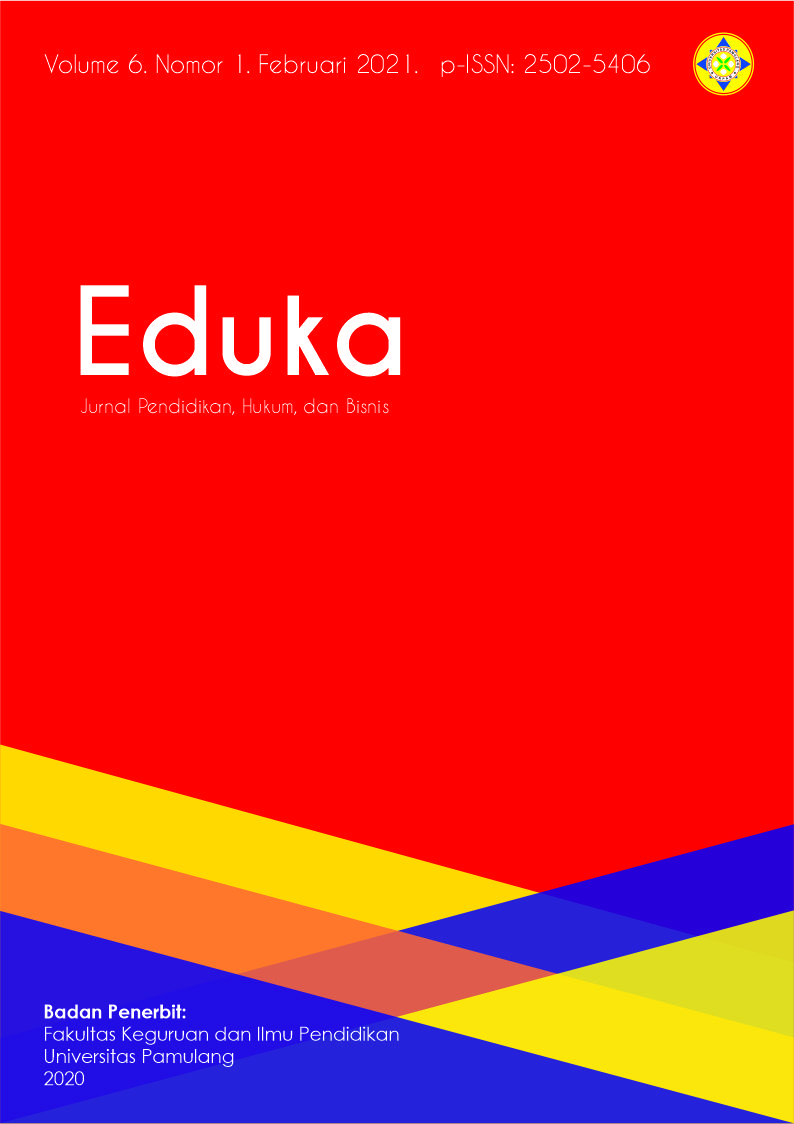Pengaruh Model Blended Learning Terhadap Prestasi Mahasiswa Ditinjau dari Locus of Control
DOI:
https://doi.org/10.32493/eduka.v6i1.9484Abstract
ABSTRACT
The aim of this study was to analyze the effect of the blended learning model on student achievement in the Faculty of Economics and Business, Jenderal Soedirman University in terms of locus of control using web media. The approach used in this research is quantitative research. Data collection method is done through pretest and posttest to find out student achievement, while for locus of control ability is measured by questionnaire. The collected data is then tested with normality, homogeneity, and anova tests as well as the t test for pretest and posttest, while for the activeness data is tested by regression test and independent sample t-test. The result of analysis shows data is normal and homogent with significantion estimate of 0,05 that 0,510 for experiment class and 0,108 for control class. To Anova test for estimate F 2.515 and significantion estimate of 0,001, and to Independent Sample Test the estimate for Sig.(2-tailed) that 0,01< 0,05, then can be conclusion that there is different between student achievement and locus of control ability among experiment class team with control class team.
Keywords: Blended Learning Model; Locus of Control; Learning Achievement.
ABSTRAK
Penelitian ini bertujuan untuk menganalisis pengaruh model blended learning terhadap prestasi belajar mahasiswa ditinjau dari locus of control di Fakultas Ekonomi Dan Bisnis, Universitas Jenderal Soedirman dengan media web. Penelitian ini menggunakan penelitian kuantitatif, untuk menggumpulkan data untuk prestasi belajar menggunakan pretest dan posttest, sedangkan untuk kemampuan locus of control menggunakan kuesioner. Data yang diperoleh lalu di ujikan dengan uji normalitas, homogenitas, dan anova serta uji t untuk pretest dan posttest, sedangkan untuk data keaktifan di uji dengan uji regresi dan uji independent sampel t-test. Hasil analisis menunjukkan bahwa data berdistribusi normal dan homogen dengan nilai signifikansi sebesar 0,05 yaitu 0,510 untuk kelas eksperimen dan 0,108 untuk kelas kontrol. Untuk uji anova didapatkan nilai nilai F 2.515 dan nilai signifikansi sebesar 0,001, dan untuk nilai Uji Independent Sample T-Test diperoleh nilai Sig.(2-tailed) sebesar 0,01<0,05, maka sesuai dasar pengambilan keputusan dalam Uji Independent Sampel T-Test, maka dapat disimpulkan bahwa terdapat perbedaan antara prestasi belajar dan kemampuan locus of contol antara kelompok kelas eksperimen dengan kelompok kelas kontrol.
Kata kunci: Model Blended Learning; Locus of Control; Prestasi Belajar.
References
Achadiyah, B. N., & Laily, N. (2013). Pengaruh Locus of Control Terhadap Hasil Belajar Mahasiswa Akuntansi. Jurnal Pendidikan Akuntansi Indonesia, 11(2), 11–18. https://doi.org/10.21831/jpai.v11i2.1687
APJII. (2019). Buletin APJII. Asosiasi Penyelenggara Jasa Internet Indonesia, 1. https://apjii.or.id/content/read/104/503/BULETIN-APJII-EDISI-74---November-2020
Banggur, M. D. V., Situmorang, R., & Rusmono, R. (2018). Pengembangan Pembelajaran Berbasis Blended Learning Pada Mata Pelajaran Etimologi Multimedia. JTP - Jurnal Teknologi Pendidikan, 20(2), 152–165. https://doi.org/10.21009/jtp.v20i2.8629
Fadilah, F., & Mahyuny, S. R. (2019). Analisis Faktor Yang Mempengaruhi Locus Of Control Mahasiswa Pendidikan Matematika FKIP Universitas Samudra. Jurnal IPA & Pembelajaran IPA, 2(2), 100–105. https://doi.org/10.24815/jipi.v2i1.10731
Harahap, F., Nasution, N. E. A., & Manurung, B. (2019). The Effect of Blended Learning on Student’s Learning Achievement and Science Process Skills in Plant Tissue Culture Course. International Journal of Instruction, 12(1), 521–538. https://doi.org/10.29333/iji.2019.12134a
Isti’anah, A. (2017). The Effect of Blended Learning to The Students ’ Achievement Blended learning has been popular in language learning and. Indonesian Journal of English Education, 4(1), 16–30. https://doi.org/10.15408/ijee.v4i1.5697.IJEE
Izzaty, R. E., Ayriza, Y., Setiawati, F. A., & Amalia, R. N. (2017). Prediktor Prestasi Belajar Siswa Kelas 1 Sekolah Dasar. Jurnal Psikologi, 44(2), 153. https://doi.org/10.22146/jpsi.27454
James KPOLOVIE, P., Igho JOE, A., & Okoto, T. (2014). Academic Achievement Prediction: Role of Interest in Learning and Attitude towards School. International Journal of Humanities Social Sciences and Education, 1(11), 73–100. www.arcjournals.org
Kantun, S. (2016). IMPLEMENTASI BLENDED LEARNING UNTUK MENINGKATKAN KREATIVITAS DAN HASIL BELAJAR PADA MATA PELAJARAN EKONOMI PESERTA DIDIK KELAS XI IPS-2 SMAN 5 JEMBER SEMESTER GASAL TAHUN 2015/2016. ΔιεθνÎÏ‚ ΣυνÎδÏιο Για Την Ανοικτή & Εξ Αποστάσεως Εκπαίδευση, 7(6B), 141–152. https://doi.org/10.12681/icodl.591
Lawrence, a S. A., & Vimala, A. (2012). School environment and academic achievement of standard IX students. Journal of Educational and Instructional Studies in the World, 2(3), 210–215. http://files.eric.ed.gov/fulltext/ED542331.pdf
Maya, Y. (2020). Penggunaan Blended Learning Pada Pembelajaran Era Industri 4.0. Jurnal Pendidikan Bahasa Dan Sastra Indonesia, 4(2), 44–59.
Oweis, T. I. (2018). Effects of Using a Blended Learning Method on Students’ Achievement and Motivation to Learn English in Jordan: A Pilot Case Study. Education Research International, 2018. https://doi.org/10.1155/2018/7425924
Sihabudin, S. (2018). Pengaruh Strategi Blended Learning Terhadap Hasil Belajar Mata Kuliah Sejarah Pendidikan Islam Pada Mahasiswa Yang Memiliki Locus of Control Berbeda. JINOTEP (Jurnal Inovasi Dan Teknologi Pembelajaran) Kajian Dan Riset Dalam Teknologi Pembelajaran, 3(1), 72–89. https://doi.org/10.17977/um031v3i12016p072
Syafi’i, A., Marfiyanto, T., & Rodiyah, S. K. (2018). Studi Tentang Prestasi Belajar Siswa Dalam Berbagai Aspek Dan Faktor Yang Mempengaruhi. Jurnal Komunikasi Pendidikan, 2(2), 115. https://doi.org/10.32585/jkp.v2i2.114
Syatriadin, S. (2017). Locus of Control : Teori Temuan Penelitian dan Reorientasinya dalam Manajemen Penanganan Kesulitan Belajar Peserta Didik. Fondatia, 1(1), 144–164. https://doi.org/10.36088/fondatia.v1i1.93
Widiara, I. K. (2018). Blended Learning Sebagai Alternatif Pembelajaran Di Era Digital. Purwadita, 2(2), 50–56.













